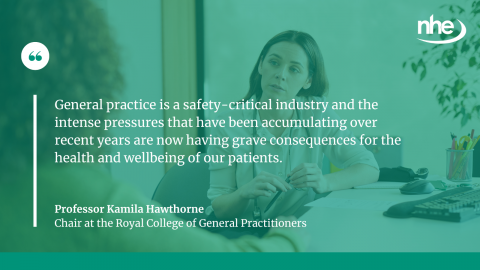More than three-quarters (76%) of GPs think their excessive workloads are compromising patient safety, according to a new survey conducted by the Royal College of General Practitioners (RCGP), as we stand just days away from the general election.
Data from the poll suggests that around six in 10 (60%) GPs believe they do not have enough time to adequately assess and treat their patients — a similar amount (62%) report that they do not have enough time to build a strong relationship with their patients, thus impacting the quality of care delivered.
The RCGP is calling for funding to be directed into the profession by the next government. Nearly three in four (71%) survey respondents think that, if their practice had improved staffing and resourcing, they could better alleviate pressure from hospitals.
"Our number one priority is the safety of our patients, and it is alarming to hear how many GPs feel this is being compromised by the immense workload pressures they are working under,” said the RCGP’s chair, Professor Kamila Hawthorne.
“The fact that so many of our members say they're not able to provide the high quality, safe care their patients deserve shows that it is patients who are bearing the brunt of the crisis in general practice.”
This is all just after the RCGP warned that the number of appointments being delivered in general practice was unsustainable given current workforce pressures.

According to NHS England figures, GP teams delivered 30.5 million appointments in May, which is approximately 5.2 million more than were delivered during the same month in 2019. This is despite there being around 480 fewer filly qualified, full-time equivalent GPs than in December 2019.
In turn, GPs are now responsible for 149 more patients than they were five years ago, with the average number of patients per fully qualified GP now standing just shy of 2,300. This is neither sustainable nor manageable, according to Prof Hawthorne.
Despite the elevated burden, the RCGP has said that six out of 10 job-seeking GPs have struggled to find vacancies to apply to — the royal college points to the prioritisation of roles such as physiotherapists, pharmacists and physician associates as the reason for this.
"We know how much our patients value our services and we want to deliver,” explained Prof Hawthorne. “But to do this we need to ensure that general practice is properly staffed. Which is why we’re calling on the next government to dedicate funding for recruitment and retention initiatives to ensure that there are enough GPs to safeguard the future of general practice.”
The RCGP paints this as “the only real route” to improved patient access to safe, timely and appropriate care, urging the political heavyweights to take notice and act accordingly.
The Labour Party’s manifesto did outline how it wants to shift more resources upstream into primary and community services, which would be spearheaded by recruiting more GPs. Plus, there would be a return to the ‘family doctor’ approach under Sir Keir Starmer and Wes Streeting’s leadership, according to Labour.
Meanwhile the Conservatives’ manifesto promised that, by the end of the next parliament, there would be 28,000 more doctors working in the NHS than in 2023. This is in addition to building or modernising 250 GP surgeries.
Both manifestos from the two main UK political powers have been widely criticised for their lack of detail, however, with Nuffield Trust CEO, Thea Stein, outright questioning the financial credibility of the Labour, Conservative, and Liberal Democrat spending plans.
The news also comes shortly after a similar survey was conducted by the Royal College of Nursing, which revealed concerns about patient safety.
Image credit: iStock



















